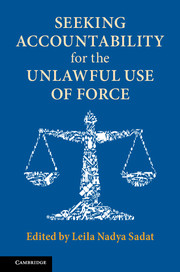Book contents
- Frontmatter
- Dedication
- Contents
- Notes on Contributors
- Foreword
- Preface
- Table of Cases
- Introduction
- PART I HISTORIC AND CONTEMPORARY PERSPECTIVES ON THE UNLAWFUL USE OF FORCE
- PART II MECHANISMS FOR RESTRAINING THE UNLAWFUL USE OF FORCE AND ENHANCING ACCOUNTABILITY
- PART III THE ILLEGAL USE OF FORCE AND THE PROSECUTION OF INTERNATIONAL CRIMES
- 12 The Crime of Aggression under Customary International Law
- 13 The Crime of Aggression and the International Criminal Court
- 14 Prosecuting Aggression Through Other Universal Core Crimes at the International Criminal Court
- 15 The Illegal Use of Force (Other Inhumane Act) as a Crime Against Humanity: An Assessment of the Case for a New Crime at the International Criminal Court
- 16 Aggression, Atrocities, and Accountability: Building a Case in Iraq
- PART IV IMAGINING A BETTER WORLD
- Epilogue
- Index
12 - The Crime of Aggression under Customary International Law
from PART III - THE ILLEGAL USE OF FORCE AND THE PROSECUTION OF INTERNATIONAL CRIMES
Published online by Cambridge University Press: 21 May 2018
- Frontmatter
- Dedication
- Contents
- Notes on Contributors
- Foreword
- Preface
- Table of Cases
- Introduction
- PART I HISTORIC AND CONTEMPORARY PERSPECTIVES ON THE UNLAWFUL USE OF FORCE
- PART II MECHANISMS FOR RESTRAINING THE UNLAWFUL USE OF FORCE AND ENHANCING ACCOUNTABILITY
- PART III THE ILLEGAL USE OF FORCE AND THE PROSECUTION OF INTERNATIONAL CRIMES
- 12 The Crime of Aggression under Customary International Law
- 13 The Crime of Aggression and the International Criminal Court
- 14 Prosecuting Aggression Through Other Universal Core Crimes at the International Criminal Court
- 15 The Illegal Use of Force (Other Inhumane Act) as a Crime Against Humanity: An Assessment of the Case for a New Crime at the International Criminal Court
- 16 Aggression, Atrocities, and Accountability: Building a Case in Iraq
- PART IV IMAGINING A BETTER WORLD
- Epilogue
- Index
Summary
INTRODUCTION
The crime of aggression in international law is an extrapolation of an earlier concept of crimes against peace. Whatever designation is preferred, the gravamen is the same: individual penal accountability for acts committed on behalf of a State. In terms of the sphere of application of the crime of aggression and crimes against peace, this Chapter will show that – while the semantics have changed – the difference between them is more apparent than real.
THE NUREMBERG LEGACY
Crimes against peace entered the international legal vocabulary, for the first time, in the Charter of the International Military Tribunal (annexed to an Agreement done in London in 1945) for the prosecution of the major German criminals in World War II. Article 6(a) of the Charter defines crimes against peace as follows: “planning, preparation, initiation or waging of a war of aggression, or a war in violation of international treaties, agreements or assurances, or participation in a common plan or conspiracy for the accomplishment of any of the foregoing.” The London Agreement originally had as Contracting Parties the four principal Allied Powers in the War – the United States, the Union of Soviet Socialist Republics, the United Kingdom, and France – but later it was adhered to by nineteen additional Allied States.
The London Charter served as the foundation for the Nuremberg trial before the International Military Tribunal. The nucleus of Article 6(a) was soon reiterated, with some variations, in Article II(1) of Control Council Law No. 10 (forming the legal basis of the so-called subsequent proceedings at Nuremberg, in which lower-level German criminals were tried by American military tribunals), and in Article 5 of the Charter of the International Military Tribunal for the Far East (issued in a Proclamation by General Douglas MacArthur, in his capacity as Supreme Commander of the Allied Powers in the region, and designed for the trial of the major Japanese criminals in World War II).
In its Judgment of 1946, the International Military Tribunal at Nuremberg held that the text of Article 6(a) of the London Charter expressed modern international law, which regarded a war of aggression as a grave crime. Hence, the Tribunal rejected the argument that the provision amounted to ex post facto criminalization of the acts of the defendants in breach of the nullum crimen sine lege principle.
- Type
- Chapter
- Information
- Seeking Accountability for the Unlawful Use of Force , pp. 285 - 302Publisher: Cambridge University PressPrint publication year: 2018
- 2
- Cited by



